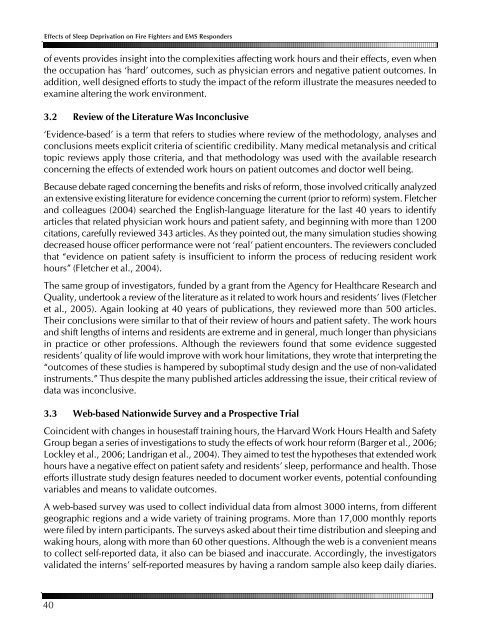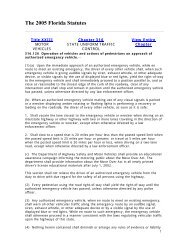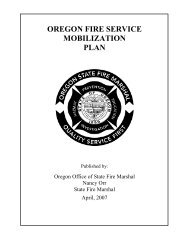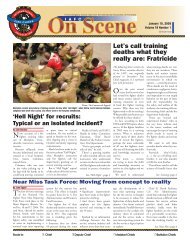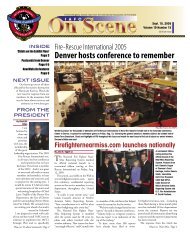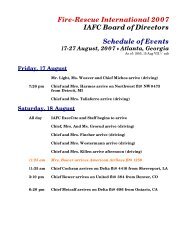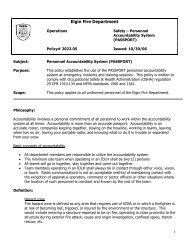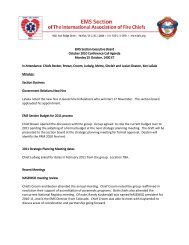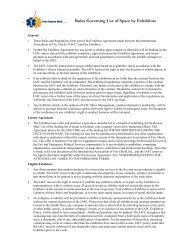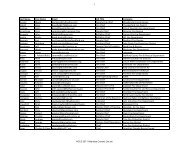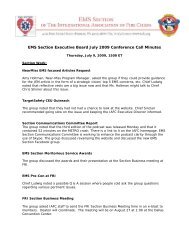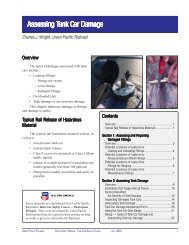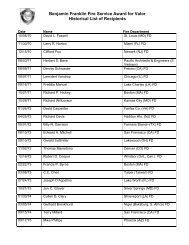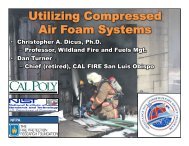Effects of Sleep Deprivation on Fire Fighters and EMS ... - NAEMT
Effects of Sleep Deprivation on Fire Fighters and EMS ... - NAEMT
Effects of Sleep Deprivation on Fire Fighters and EMS ... - NAEMT
You also want an ePaper? Increase the reach of your titles
YUMPU automatically turns print PDFs into web optimized ePapers that Google loves.
<str<strong>on</strong>g>Effects</str<strong>on</strong>g> <str<strong>on</strong>g>of</str<strong>on</strong>g> <str<strong>on</strong>g>Sleep</str<strong>on</strong>g> <str<strong>on</strong>g>Deprivati<strong>on</strong></str<strong>on</strong>g> <strong>on</strong> <strong>Fire</strong> <strong>Fighters</strong> <strong>and</strong> <strong>EMS</strong> Resp<strong>on</strong>ders<br />
<str<strong>on</strong>g>of</str<strong>on</strong>g> events provides insight into the complexities affecting work hours <strong>and</strong> their effects, even when<br />
the occupati<strong>on</strong> has ‘hard’ outcomes, such as physician errors <strong>and</strong> negative patient outcomes. In<br />
additi<strong>on</strong>, well designed efforts to study the impact <str<strong>on</strong>g>of</str<strong>on</strong>g> the reform illustrate the measures needed to<br />
examine altering the work envir<strong>on</strong>ment.<br />
3.2 Review <str<strong>on</strong>g>of</str<strong>on</strong>g> the Literature Was Inc<strong>on</strong>clusive<br />
‘Evidence-based’ is a term that refers to studies where review <str<strong>on</strong>g>of</str<strong>on</strong>g> the methodology, analyses <strong>and</strong><br />
c<strong>on</strong>clusi<strong>on</strong>s meets explicit criteria <str<strong>on</strong>g>of</str<strong>on</strong>g> scientific credibility. Many medical metanalysis <strong>and</strong> critical<br />
topic reviews apply those criteria, <strong>and</strong> that methodology was used with the available research<br />
c<strong>on</strong>cerning the effects <str<strong>on</strong>g>of</str<strong>on</strong>g> extended work hours <strong>on</strong> patient outcomes <strong>and</strong> doctor well being.<br />
Because debate raged c<strong>on</strong>cerning the benefits <strong>and</strong> risks <str<strong>on</strong>g>of</str<strong>on</strong>g> reform, those involved critically analyzed<br />
an extensive existing literature for evidence c<strong>on</strong>cerning the current (prior to reform) system. Fletcher<br />
<strong>and</strong> colleagues (2004) searched the English-language literature for the last 40 years to identify<br />
articles that related physician work hours <strong>and</strong> patient safety, <strong>and</strong> beginning with more than 1200<br />
citati<strong>on</strong>s, carefully reviewed 343 articles. As they pointed out, the many simulati<strong>on</strong> studies showing<br />
decreased house <str<strong>on</strong>g>of</str<strong>on</strong>g>ficer performance were not ‘real’ patient encounters. The reviewers c<strong>on</strong>cluded<br />
that “evidence <strong>on</strong> patient safety is insufficient to inform the process <str<strong>on</strong>g>of</str<strong>on</strong>g> reducing resident work<br />
hours” (Fletcher et al., 2004).<br />
The same group <str<strong>on</strong>g>of</str<strong>on</strong>g> investigators, funded by a grant from the Agency for Healthcare Research <strong>and</strong><br />
Quality, undertook a review <str<strong>on</strong>g>of</str<strong>on</strong>g> the literature as it related to work hours <strong>and</strong> residents’ lives (Fletcher<br />
et al., 2005). Again looking at 40 years <str<strong>on</strong>g>of</str<strong>on</strong>g> publicati<strong>on</strong>s, they reviewed more than 500 articles.<br />
Their c<strong>on</strong>clusi<strong>on</strong>s were similar to that <str<strong>on</strong>g>of</str<strong>on</strong>g> their review <str<strong>on</strong>g>of</str<strong>on</strong>g> hours <strong>and</strong> patient safety. The work hours<br />
<strong>and</strong> shift lengths <str<strong>on</strong>g>of</str<strong>on</strong>g> interns <strong>and</strong> residents are extreme <strong>and</strong> in general, much l<strong>on</strong>ger than physicians<br />
in practice or other pr<str<strong>on</strong>g>of</str<strong>on</strong>g>essi<strong>on</strong>s. Although the reviewers found that some evidence suggested<br />
residents’ quality <str<strong>on</strong>g>of</str<strong>on</strong>g> life would improve with work hour limitati<strong>on</strong>s, they wrote that interpreting the<br />
“outcomes <str<strong>on</strong>g>of</str<strong>on</strong>g> these studies is hampered by suboptimal study design <strong>and</strong> the use <str<strong>on</strong>g>of</str<strong>on</strong>g> n<strong>on</strong>-validated<br />
instruments.” Thus despite the many published articles addressing the issue, their critical review <str<strong>on</strong>g>of</str<strong>on</strong>g><br />
data was inc<strong>on</strong>clusive.<br />
3.3 Web-based Nati<strong>on</strong>wide Survey <strong>and</strong> a Prospective Trial<br />
Coincident with changes in housestaff training hours, the Harvard Work Hours Health <strong>and</strong> Safety<br />
Group began a series <str<strong>on</strong>g>of</str<strong>on</strong>g> investigati<strong>on</strong>s to study the effects <str<strong>on</strong>g>of</str<strong>on</strong>g> work hour reform (Barger et al., 2006;<br />
Lockley et al., 2006; L<strong>and</strong>rigan et al., 2004). They aimed to test the hypotheses that extended work<br />
hours have a negative effect <strong>on</strong> patient safety <strong>and</strong> residents’ sleep, performance <strong>and</strong> health. Those<br />
efforts illustrate study design features needed to document worker events, potential c<strong>on</strong>founding<br />
variables <strong>and</strong> means to validate outcomes.<br />
A web-based survey was used to collect individual data from almost 3000 interns, from different<br />
geographic regi<strong>on</strong>s <strong>and</strong> a wide variety <str<strong>on</strong>g>of</str<strong>on</strong>g> training programs. More than 17,000 m<strong>on</strong>thly reports<br />
were filed by intern participants. The surveys asked about their time distributi<strong>on</strong> <strong>and</strong> sleeping <strong>and</strong><br />
waking hours, al<strong>on</strong>g with more than 60 other questi<strong>on</strong>s. Although the web is a c<strong>on</strong>venient means<br />
to collect self-reported data, it also can be biased <strong>and</strong> inaccurate. Accordingly, the investigators<br />
validated the interns’ self-reported measures by having a r<strong>and</strong>om sample also keep daily diaries.<br />
40


